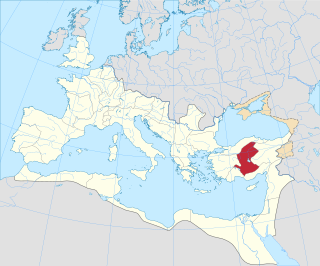Related Research Articles
Marcus Annius Libo was a Roman Senator active in the early second century AD.
Amnius Manius Caesonius Nicomachus Anicius PaulinussignoHonorius was a politician of the Roman Empire.
(Marcus) Caeionius Proculus was a suffect consul in 289.
Marcus Caeionius Silvanus was a Roman senator of the second century AD.

Sextilia was the mother of Lucius Vitellius the Younger and Aulus Vitellius.

Galatia was the name of a province of the Roman Empire in Anatolia. It was established by the first emperor, Augustus, in 25 BC, covering most of formerly independent Celtic Galatia, with its capital at Ancyra.
Lucius Egnatius Victor Lollianus was a Roman military officer and senator, who served as governor of a number of provinces of the Roman East, including Galatia, Achaea, Bithynia and Pontus, Pannonia Inferior, and Asia. He has been called "the best documented governor of the province of Asia in the Imperial period" on account of the large number of surviving monuments erected in his honour.
(Lucius) Egnatius Victor was a Roman military officer and senator who was appointed suffect consul for an uncertain nundinium prior to 207.
Marcus Egnatius Marcellinus was a senator of Imperial Rome.
Quintus Egnatius Proculus was a Roman senator.
Quintus Egnatius Proculus was a Roman aristocrat.
Quintus Egnatius Gallienus Perpetuus was a Roman politician.
Aulus Egnatius Proculus was a Roman military officer and senator who was appointed suffect consul either during the late second century or early third century.
The gens Egnatia was a plebeian family of equestrian rank at ancient Rome. Only a few of the Egnatii held any magistracies, of whom the most important may have been Gnaeus Egnatius, who held the praetorship during the second century BC, and served as governor of Macedonia, shortly after its institution as a Roman province.
The gens Nasennia was an obscure plebeian family at Rome. None of the Nasennii held any of the higher offices of the Roman state, and the family is best known from Gaius Nasennius, a soldier in the time of Caesar. Many other Nasennii are known from inscriptions.

The gens Plautia, sometimes written Plotia, was a plebeian family at ancient Rome. Members of this gens first appear in history in the middle of the fourth century BC, when Gaius Plautius Proculus obtained the consulship soon after that magistracy was opened to the plebeian order by the lex Licinia Sextia. Little is heard of the Plautii from the period of the Samnite Wars down to the late second century BC, but from then to imperial times they regularly held the consulship and other offices of importance. In the first century AD, the emperor Claudius, whose first wife was a member of this family, granted patrician status to one branch of the Plautii.
Egnatius may refer to:
The gens Umbricia was a minor plebeian family at ancient Rome. Only a few members of this gens are mentioned by Roman writers, but they had achieved senatorial rank by the second century. The most famous of the Umbricii are probably the haruspex Gaius Umbricius Melior, who served the emperors of the middle first century, and Aulus Umbricius Scaurus, a merchant of Pompeii whose fish sauces were widely distributed. Quintus Umbricius Proculus was a second-century governor of Hispania Citerior. Many other Umbricii are known from inscriptions.
References
- Christian Settipani. Continuité gentilice et continuité sénatoriale dans les familles sénatoriales romaines à l'époque impériale , 2000[ page needed ]